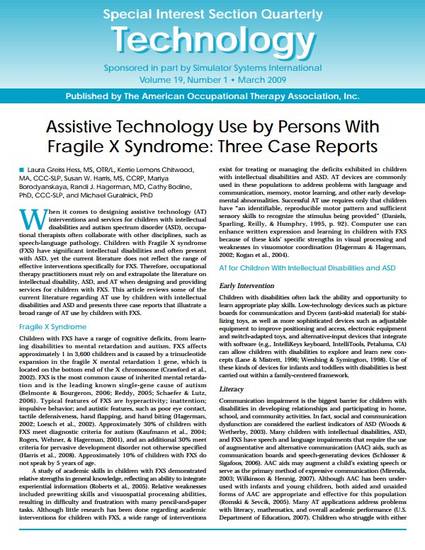
Article
Assistive Technology Use by Persons with Fragile X Syndrome
Technology Special Interest Section Quarterly
(2009)
Abstract
OBJECTIVES. This preliminary study examined sensory processing and its relationship to occupational performance in children with fragile X syndrome (FXS) to guide research and evidence-based practice.
METHOD. Fifteen school-aged boys with full-mutation FXS were assessed with three occupational performance measures (School Function Assessment, Vineland Adaptive Behavior Scales, play duration) and three sensory processing measures (Sensory Profile, Tactile Defensiveness and Discrimination Test–Revised, Sensory Approach–Avoidance Rating). Data were analyzed using partial correlation procedures.
RESULTS. Several significant correlations were found, independent of effects of age and IQ. Avoidance of sensory experiences (internally controlled) was associated with lower levels of school participation, self-care, and play. Aversion to touch from externally controlled sources was associated with a trend toward greater independence in self-care—opposite of expectations.
CONCLUSION. This study links sensory processing vulnerabilities with individual differences in occupational performance and supports a dynamic view of self-organizing systems. Children’s uses of avoidant versus independent behaviors may reflect different self-regulatory or coping strategies that potentially mediate the relationship between sensory processing deficits and occupational behaviors and warrant further investigation.
Keywords
- Fragile X Syndrome,
- Fragile X,
- FXS,
- developmental disabilities,
- sensory integration,
- sensory modulation
Disciplines
Publication Date
March, 2009
Citation Information
Laura Greiss Hess, K. L. Chitwood, S. W. Harris, M. Borodyankaya, et al.. "Assistive Technology Use by Persons with Fragile X Syndrome" Technology Special Interest Section Quarterly Vol. 19 Iss. 1 (2009) p. 1 - 4 ISSN: 10937137 Available at: http://works.bepress.com/laura_greisshess/4/
